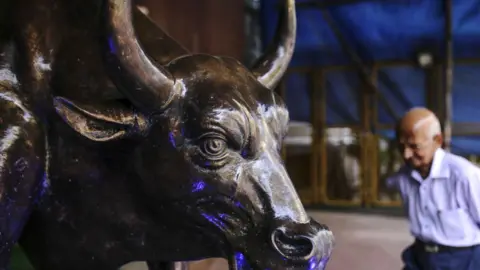Nikhil InamdarBBC News, Mumbai
 Bloomberg via Getty Images
Bloomberg via Getty ImagesIndia’s start-up listing rush has shown no signs of slowing down recently – and this week has been no different.
One unicorn – a tech start-up valued at more than $1bn – has made its debut on the country’s stock markets, and two more are in the offing.
The $821m (£623m) share offering of eyewear solutions firm Lenskart, founded by a flamboyant Shark Tank India judge, was sold out in less than a few hours despite mind-boggling valuations. It had a shaky market debut on Monday.
The other big company debuting on the exchanges on Wednesday is Groww – the country’s largest retail brokerage backed by Microsoft CEO Satya Nadella. Its issue got 17 times more demand from investors than the number of shares available for sale. Pine Labs, a fintech unicorn, will list later in the week.
These listings come amid an already hectic start-up IPO (initial public offering) season that’s seen a diverse range of once fledgling tech businesses – from home services platform Urban Company to YouTube channel turned ed-tech unicorn Physics Wallah – tapping the stock market for investor dollars.
The dizzying fundraising frenzy has raised several uncomfortable questions about the expensive valuations commanded by these often-unprofitable newbie companies. But experts say it also signals a maturing of India’s start-up ecosystem after a painful funding winter where money had all but dried up and early-stage venture capitalists were finding it difficult to cash out.
 Bloomberg via Getty Images
Bloomberg via Getty ImagesThe new wave of IPOs is finally giving many funds a chance to exit their early bets.
“Exiting our investments was one of the prominent concerns when we were raising our fund in 2015-16, so these are really encouraging times for us,” Anil Joshi, an angel investor who’s funded around 100 early-stage startups, told the BBC.
Shailendra Singh, managing director of PeakXV Partners – a global venture capital firm which has some $9bn invested across several high-profile Indian start-ups including Groww and Pine Labs – attributes the robust demand for these IPOs to better regulation and a wider diversity of participants, including small mom-and-pop investors, mutual funds and insurers, pumping money into India’s equity markets.
“Historically there was no appetite for these high growth companies. This has now changed,” Shailendra Singh said. “Because with more market participants, a more diverse set of companies are hitting the market.”
A flush of money from these new investors has fired up some 43 start-up IPOs this year till the beginning of November. That’s five times the number of start-ups that went public in 2020 and a doubling since 2023, according to data shared by market intelligence firm Tracxn.
But there is growing concern that while many of these IPOs are delivering substantial profits to early investors who are cashing out, new investors – ordinary people buying the shares for the first time – have little chance of making a profit afterward.
While admitting that valuations are “structurally high” in India, Shailendra Singh says tech companies with very high operating margins tend to trade richly, not just in India, but across the world.
He believes start-up founders should be sensible when pricing their shares for the public, since they owe a duty to protect small investors’ money. But he doesn’t think every start-up IPO is overpriced or unfair.
Several start-up IPOs like Zomato, Nykaa, Ixigo and others have generated terrific returns for investors, said Shailendra Singh.
What has also changed is that “today’s listings are grounded in profitability and good governance”, Anand Daniel, partner at venture capital firm Accel, told the BBC.
“Strong businesses with clear fundamentals are going public, while some start-ups go back to the drawing board and reassess the future.”
 Bloomberg via Getty Images
Bloomberg via Getty ImagesAccording to Neha Singh, co-founder of Tracxn, even as mature start-ups go public, fewer Indian start-ups overall are having to wind up or go back to the drawing board – an encouraging trend.
This is possibly as more founders increasingly prioritise “sustainability, profitability, and disciplined capital use over aggressive expansion”, said Neha Singh.
Tracxn data shows just 724 start-ups shut down so far in 2025 a decline of 81% compared to over 3,900 startups downing the shutters during the same period in 2024, a figure which was itself down on earlier years in the decade.
The sector is transitioning from “rapid growth” to “strategic sustainability”, Neha Singh said.
But even as more founders raise money through IPOs, private equity and venture capital funding into new companies hasn’t returned to Covid-era highs.
At $9.8bn, funds raised by India’s tech start-ups in 2025 are still a shadow of the $40bn raised in 2021, and marginally lower than last year’s $12.6bn.
“We’ve moved from a phase of exuberance to one of thoughtful capital deployment. Deal volumes may be lower than the peak years, but the quality of companies being funded is higher,” says Mr Daniel.
While founders who have focused on quality, profitability and governance will continue to find capital, the market has become more discerning, adds Mr Daniel, “which is ultimately good for founders building for the long term”.
But recent policy measures, such as the abolition of an angel tax, are expected to further strengthen investor confidence in India.
As for start-up IPOs, could the momentum continue next year?
“The capital markets are inherently cyclical and it is impossible to say whether 2026 will be the same,” says Shailendra Singh.
For now, though, private investors are making hay as the public markets lap up stakes in the start-ups they placed early bets on.
Follow BBC News India on Instagram, YouTube, X and Facebook.



